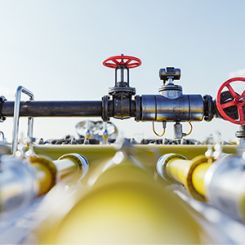
Water management is one of the most prevalent concerns in the oil and gas industry. With hydraulic fracturing needing on average over 500,000 barrels of water per frac, the exploration and production (E&P) companies are faced with the challenge of sourcing, transporting, disposing of and in some cases recycling produced water at an affordable cost.
The recycling of produced water is not new to the industry; however, due to the cost of fresh water on the rise (while many shale formations are located in areas affected by prolonged, exceptional drought), oil and gas operators are now focused on recycling produced water. As with most areas in this industry, costs are a major concern.
Fresh Water vs. On-Site Recycled Produced Water
The comparison of the costs associated with the use of fresh water versus on-site recycled produced water (RPW) is multifaceted. Fresh water costs include the cost of purchasing or procuring from wells or other water sources, the transportation of this water to location and the chemicals and process needed to treat the water to make it ready for fracking. The costs of RPW for on-site reuse primarily include treating the produced water to make it ready for fracking, as the other costs are essentially eliminated.
As the cost of fresh water increases and the cost to recycle and reuse produced water decreases, the economic incentive to switch is emerging as a clear solution.
Extractors can use 100% RPW, eliminating their fracking need for fresh water. The bottleneck to getting to 100% use is in the existing infrastructure, such as limited capacity of existing storage tanks and pipeline distribution lines to hold and transport RPW, capacity that is now poised to grow as the cost and liabilities of using fresh water rises.
Limit Use of Conventional Disposal Methods
For produced water that is not recycled, injecting it into specially designed saltwater disposal wells is the most common method of disposal. However, this practice is falling out of favor for several reasons. While thought to be the safest option for produced water disposal, there is growing public concern that the wells can eventually leak into the groundwater and could contribute to seismic tremors. Additional costs associated with this disposal method include trucking away the produced water.
Recycling produced water reduces the need for this disposal method, but it is only a partial solution to the disposal problem because the overall hydraulic fracturing process almost always produces more water than is needed for the fracturing stage on subsequent wells. To solve the rest of the problem, look to new revenue streams, which offer both reduction of disposal costs and increase in revenue.
New Revenue Streams
For surplus RPW, new revenue streams are emerging to further decrease reliance on and divert water from conventional disposal methods. Midstream operators are growing their recycling service offerings and accepting more produced water from their upstream operator users, and in some cases, upstream operators are themselves recycling their own produced water. Surplus RPW can be sold to midstream operators and other hydraulic fracturing operations, especially in water-stressed areas.
Other potential uses of RPW exist in the agricultural, municipal and nongas/oil industrial sectors. These include landscape and golf course irrigation, certain nonfood crop irrigation (like cotton), sewer systems and industrial cooling. As the pressure to conserve fresh water continues its upward trajectory, the applications for recycled produced water for nonpotable use are expected to expand, creating new markets for surplus RPW.
Looking on the horizon, RPW is advancing rapidly enough that it is not out of the question that one day produced water can be desalinated and recycled to the point of being safe for food crop irrigation—perhaps even for drinking water.
Meeting ESG goals
Conventional disposal methods are becoming more associated with seismic activity and groundwater contamination. Additionally, the use of fresh water in hydraulic fracking during extreme drought is rapidly attracting the eye of public criticism and moving into the crosshairs of regulatory action. Trucking in fresh water and trucking away produced water increases carbon emissions.
Recycling produced water is offering attractive benefits for companies that track and disclose their environmental, social and governance (ESG) activity. Increasing the use of recycled produced water can help a company achieve its ESG targets in the areas of reduced emissions and water conservation, and if a company can eliminate its use of injection wells for disposal by developing markets for surplus RPW, it can allay public concern regarding earthquakes and groundwater contamination (in addition to increasing revenue).

